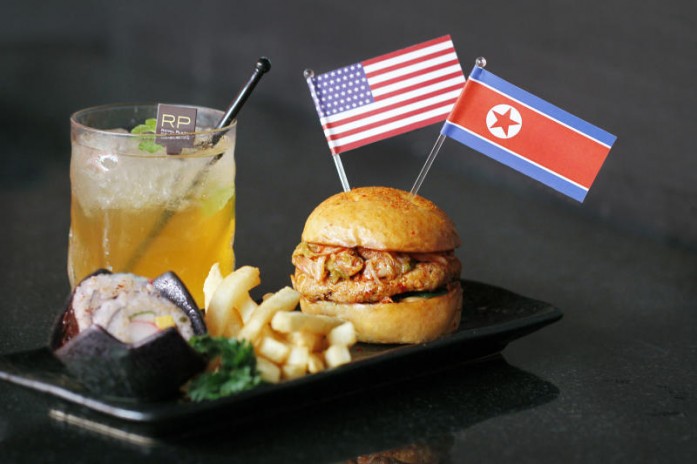
When asked whether North Korea and the United States will see hamburgers at the Singapore summit on June 12, diplomats shake their heads. There are several reasons why. First of all, a summit requires a host to host a meal whether it be a luncheon or a dinner, but the fact that the summit is to be held in an unrelated, third country makes it ambiguous as to which country is to be the host and which is to be the guest. The summit agenda remains veiled, and so, too, the lunch and dinner plans of the North Korean leader Kim Jong Un and the U.S. President Donald Trump.
Secondly, if the two leaders are to eat together, the menu should be set in advance regardless of who hosts dinner, but no channels of communication have been established. Kim Chang Son, the de facto chief of staff to the North Korean leader overseeing the ministry of defense and security, completed negotiations with the U.S. and returned to Singapore last night instead of heading back to Pyongyang via Beijing. It is unclear, however, when he will meet with his American counterpart. And last, but most importantly, the two leaders do not trust each other enough for Kim Jong Un to eat any American hamburger that Trump might offer at the table.
The solution is a “Kimchi burger.” The Royal Plaza on Scotts, a hotel in the heart of Singapore’s shopping district, has created a special “Trump Kim burger” in commemoration of the upcoming summit that it will be serving at its lounge from June 8 to June 15. The burger has a minced chicken and kimchi patty, topped with a flag from each nation. With a side of French fries and kimbap, Korean rice rolls with seaweed, the menu is priced at 12 SGD (Singapore dollars worth approximately $9, or 9,621 won). Even when President Trump visited South Korea’s Blue House last November, he ate Korean traditional dishes such as grilled Geoje Island flounder, Korean beef ribs and stone pot rice, but kimchi was not on the menu. One diplomat said, “If Trump does not like kimchi, it is not easy to put a hamburger with kimchi on the menu.”
The origin of the kimchi burger is, of course, South Korea. Several patents around the nation are already registered with the Korean Intellectual Property Office. A “mini kimchi burger” for instance uses a patty consisting of 29.8 percent beef, 44.7 percent pork, and kimchi aged to 4.7 acidity by using 5 percent less pickled fish than ordinary kimchi. The “Kimchi Burger” series developed by South Korea’s fast-food chain Lotteria is also a patented product. Sales exploded as soon as the burger came onto the market in 2001, with a whopping 60,000 sold per day, until it was unfortunately pulled off the menu in 2016.
It is also possible that the North Korea-U.S. summit will be extended to one night and two days. To not join each other for lunch or dinner for those two days would be awkward diplomatically. At the April 27 inter-Korean summit, the parties set a precedent when the guest, North Korea, brought its cold noodles from Pyongyang to the dinner hosted by South Korea. With Trump’s unpredictable nature, one may also expect a surprise from the U.S. leader with a “(Kimchi) burger luncheon.” A Kimchi burger would be a good menu item, but if Trump decides to serve the plain American burger, Kim Jong Un could counter with his Pyongyang noodles.

Leave a Reply
You must be logged in to post a comment.